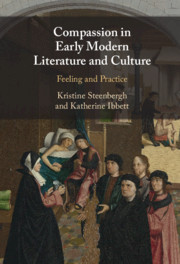Book contents
- Compassion in Early Modern Literature and Culture
- Compassion in Early Modern Literature and Culture
- Copyright page
- Contents
- Acknowledgements
- Contributors
- Introduction
- Part I Theorising
- Chapter 1 The Ethics of Compassion in Early Modern England
- Chapter 2 The Compassionate Self of the Catholic Reformation
- Part II Consoling
- Part III Exhorting
- Part IV Performing
- Part V Responding
- Part VI Giving
- Part VII Racialising
- Part VIII Contemporary Compassions
- Index
Chapter 1 - The Ethics of Compassion in Early Modern England
from Part I - Theorising
Published online by Cambridge University Press: 23 April 2021
- Compassion in Early Modern Literature and Culture
- Compassion in Early Modern Literature and Culture
- Copyright page
- Contents
- Acknowledgements
- Contributors
- Introduction
- Part I Theorising
- Chapter 1 The Ethics of Compassion in Early Modern England
- Chapter 2 The Compassionate Self of the Catholic Reformation
- Part II Consoling
- Part III Exhorting
- Part IV Performing
- Part V Responding
- Part VI Giving
- Part VII Racialising
- Part VIII Contemporary Compassions
- Index
Summary
The ethics of compassion in early modern England was rife with conflict. This chapter reveals some of the fault lines within Protestant ethics. Ethos marks the spot where character meets culture, as ethics unites four distinct aspects: character, sets of protocols for behaving, particular sites for that behaviour and ways of representing these entities of character, behaviour and action. Bruce R. Smith takes up these aspects of ethics to consider how each contributes to understanding the workings of compassion in the culture of early modern England between 1560 and 1660. His chapter considers philosophical writings, legal documents, sermons, music and theatre plays from England in the century between 1560 and 1660, a crucial time in the religious and political history of the country. It pays particular attention to the reframings of the concept of compassion in Protestantism as well as the politics of compassions vis-à-vis people of other nations and other faiths. He concludes that the 'ethics' of compassion is, at bottom, a matter of virtue, but in more complicated ways than we might at first assume.
- Type
- Chapter
- Information
- Compassion in Early Modern Literature and CultureFeeling and Practice, pp. 25 - 43Publisher: Cambridge University PressPrint publication year: 2021

